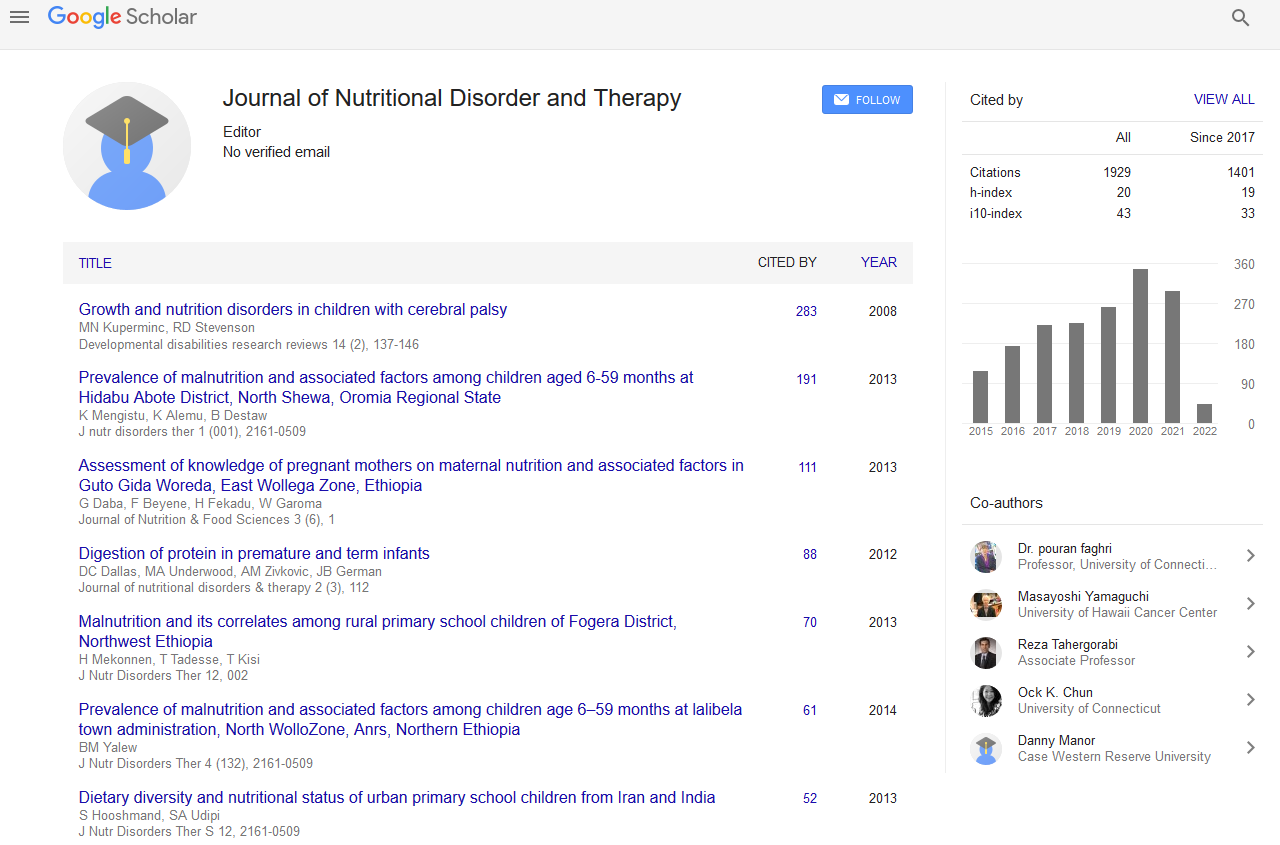Indexed In
- Open J Gate
- Genamics JournalSeek
- Academic Keys
- JournalTOCs
- Ulrich's Periodicals Directory
- RefSeek
- Hamdard University
- EBSCO A-Z
- OCLC- WorldCat
- Publons
- Geneva Foundation for Medical Education and Research
- Euro Pub
Useful Links
Share This Page
Journal Flyer

Open Access Journals
- Agri and Aquaculture
- Biochemistry
- Bioinformatics & Systems Biology
- Business & Management
- Chemistry
- Clinical Sciences
- Engineering
- Food & Nutrition
- General Science
- Genetics & Molecular Biology
- Immunology & Microbiology
- Medical Sciences
- Neuroscience & Psychology
- Nursing & Health Care
- Pharmaceutical Sciences
Effects of DPA supplementation on glucose tolerance and inflammatory markers in high fat fed animals
15th International Conference on Clinical Nutrition
May 24-26, 2018 | Vienna, Austria
Gunveen Kaur
Deakin University, Australia
Scientific Tracks Abstracts: J Nutr Disorders Ther
Abstract:
The aim of this study was to assess the effects of N-3 Docosapentaenoic Acid (DPA) supplementation on glucose tolerance in rats fed a High-Fat Diet (HFD) and to compare DPA�??s effects with those of Eicosapentaenoic Acid (EPA) and Docosahexaenoic Acid (DHA). 60 male Wistar rats (n=12 per group) were either fed a chow diet (control), HFD, or HFD with 600 mg/kg/day of EPA, DPA or DHA for four weeks. A pre and post Oral Glucose Tolerance Test (OGTT) was performed in a subset of animals (n=6 per group). Four weeks of high fat feeding led to significant (p<0.05) increase in energy intake (by 40%), body mass (by 23%) and adipose tissue mass (by 47%) in the HFD animals compared to controls. After four weeks, the HFD group showed significantly increased area under the curve (AUC) for glucose (by 14%) compared to control group showing glucose intolerance. The N-3 fatty acid feeding including DPA did not prevent the increase in body mass, adipose tissue mass and did not prevent glucose intolerance in HFD-fed animals. The analysis of plasma inflammatory markers and tissue fatty acids is currently underway to add to the above findings. However, the results so far are inconsistent with previous studies that show positive effects of EPA and DHA supplementation on glucose metabolism in HFD-fed rodents after 3�??10 weeks. These inconsistencies may be due to differences in failure to induce a greater glucose intolerance by HFD, rodent age, strain or dose and duration of N-3 fatty acid supplementation.
Biography :
Gunveen Kaur completed her PhD in Nutrition and Molecular Biology at Deakin Universty in 2007, followed by Post-doctoral research at Victoria University in Exercise Science from 2012–2014. She is currently working as a Lecturer and Researcher at Institute for Physical Activity and Nutrition (IPAN), School of Exercise and Nutritional Sciences, Deakin University. Her research is primarily focused on understanding the role of omega-3 fatty acids, particularly DPA, in prevention or management of chronic diseases such as diabetes and heart disease, at a molecular level.
Email:Gunveen.Kaur@deakin.edu.au


